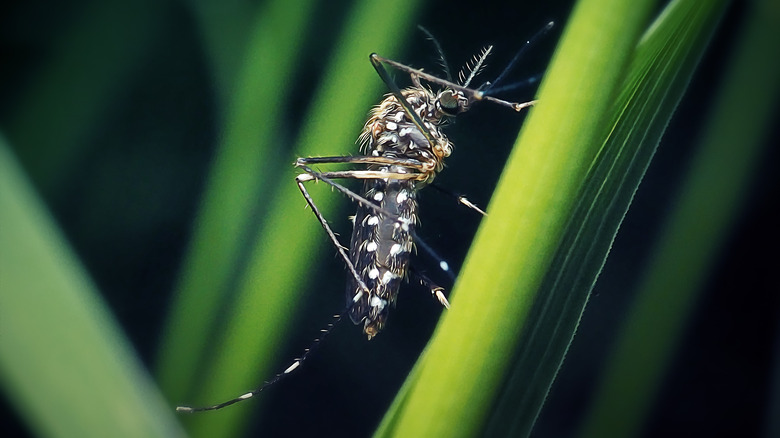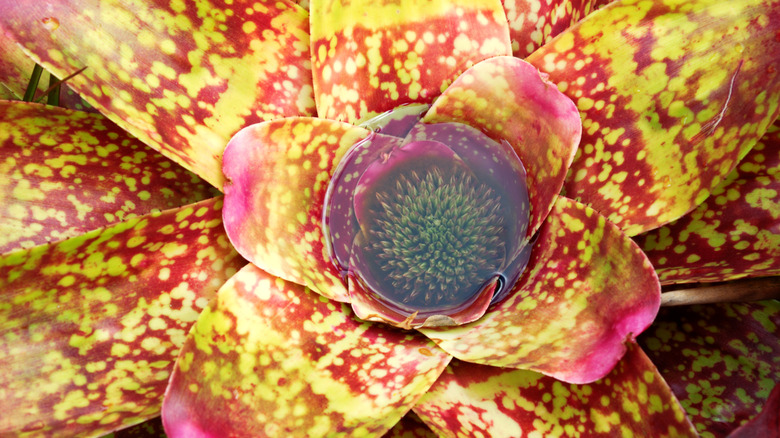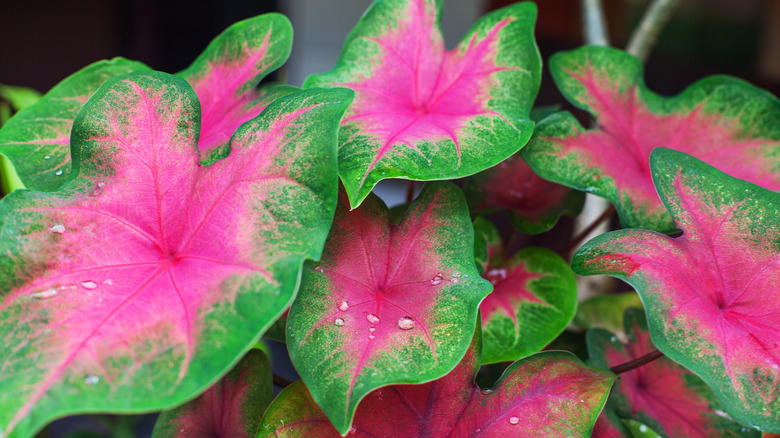The Flowering Plant That's Inviting Unwanted Mosquitoes Into The Garden
We may receive a commission on purchases made from links.
No one wants to attract more mosquitoes, but if you're growing bromeliads (Bromeliaceae), the family of spiky-topped plants that include pineapples, you might be creating a mosquito nursery right in your backyard. Mosquitoes love to lay eggs in the small puddles of water that collect at the center of many bromeliads.
Mosquitoes don't need much water for their eggs, as larvae can thrive in as little as a bottle cap or about a teaspoon of standing water. So after a rainstorm or a backyard watering, all those crevices in the center of the plant and the overlapping foliage of your bromeliads become the perfect home to new mosquitoes.It's worth noting that some bromeliads are worse than others when it comes to breeding mosquitoes. Researchers at the University of Florida and the Instituto Oswaldo Cruz-Fiocruz in Brazil found that certain bromeliads, like the flaming torch (Billbergia pyramidalis), were less hospitable to some species of mosquitoes than other types of bromeliads.
The shape of the plant and how much water it collects play a role in whether mosquitoes target it. This same study found Neoregelia spp. to be more attractive than Billbergia spp. for mosquitoes. If you want bromeliads less likely to attract mosquitoes, you can always plant bromeliads that have smaller reserve "tanks" at the center of their stalks, such as Cryptanthus spp.
Do these things to discourage mosquitoes in your bromeliads
Don't rush to toss out your favorite bromeliads, however. These resilient, no-fuss plants are gardener favorites. The unique plants don't require a lot of attention, whether they're in your flowerbeds or you plant bromeliads in hanging baskets.
Fear not, there are things you can do to kill off young mosquitoes and make sure your beloved bromeliads aren't breeding grounds for the disease-carrying pests. One step is to treat the plant's center water reservoirs with larvae-killing products like these Mosquito Bits from Summit. These granular larvae killers are typically considered safe to use around people and pets, so you shouldn't worry about your dog sniffing around a treated plant or even licking treated water from the plant. Although it is always a good idea to read the specific product instructions.
But if you don't want to use any chemicals at all, there are other natural cures. Use your garden hose to flush out standing water from your bromeliads at least once a week, since it takes about that long for most eggs to develop into larvae. If you spray the standing water out onto your stone pathway or other dry spot where it can evaporate, you'll kill mosquito eggs and larvae. You can also add a layer of vegetable oil to the water standing at the center of the plant. Vegetable oil fights mosquitoes on two fronts: it could prevent mother mosquitoes from laying eggs, and also helps seal off the water for the larvae already growing inside, killing them.
Plant these alternatives to bromeliads
If you don't want to worry about your bromeliads becoming a nursery for little mosquitoes and prefer to avoid the fuss of keeping them dry, you can always choose alternative plants. Some hearty, no-fuss plants that don't attract mosquitoes include the basket plant, also known as the false bromeliad (Callisia fragrans). It's often confused with bromeliads because it looks and feels similar, and it's also native to Mexico.
Caladiums are another good choice. This South African plant grows both indoors and out and has more than twenty different species. Their bright green and red leaves can give the pop of color that bromeliads often add to your garden, and you can even use caladiums in flower arrangements. A few tips on how to use caladiums in cut flowers will brighten up your bouquets. Don't worry if they begin to wilt in the first 24 hours. They'll rebound quickly and then might even last for up to 3 weeks.
Agave is a possible alternative to your bromeliads, too. It requires little care, just like bromeliads. There are lots of fun facts about agave, like it can be used as a sweetener in syrups, and one plant can live for decades. There are more than 250 species of agave, and they crave full sun and good drainage. All that said, keep in mind that agave can be toxic to dogs. So if you have pets that like to munch on greens, keep this plant away from them.


